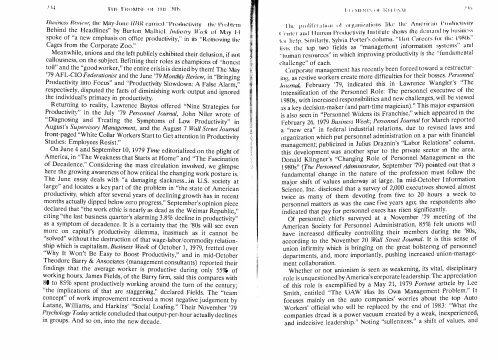CONTENTS - ouroboros ponderosa
CONTENTS - ouroboros ponderosa
CONTENTS - ouroboros ponderosa
You also want an ePaper? Increase the reach of your titles
YUMPU automatically turns print PDFs into web optimized ePapers that Google loves.
.-> \·1 Ti ll' " I\( IMISI ' fll' Ti ll' · xn ....<br />
IJusiness UIvielV; the May-June /lIJU carried "Protillclivity Iht' Prllhlnll<br />
Behind the Headlines" by Burton Malhicl. /rulll.l'lty V"d of May 1,1<br />
spoke of "a new cmphasis on office productivity," in its "Rcmovill Ihe<br />
Cages from the Corporate Zoo."<br />
Meanwhile, unions and the left publicly exhibited their delusion, if 1101<br />
callousness, on the subject. Befitting their roles as champions of "honesl<br />
toil" and the "good worker," the entire crisis is denied by them! The May<br />
'79 AFL-CIO Federationist and the June '79 Monthly Review, in "Bringing<br />
Produellvlty lOtO Focus" and "Productivity Slowdown: A False Alarm,"<br />
respectively, disputed the facts of diminishing work output and ignored<br />
the individual's primacy in productivity.<br />
Returning to reality, Lawrence Baytos offered "Nine Strategies for<br />
Productivity" in the July '79 Personnel Journal, John Niler wrote of<br />
"Diagnosing and Trcating the Symptoms of Low Productivity" in<br />
August'S Supervisory Management, and the August 7 Wall Street Journal<br />
front-paged "White Collar Workers Start to Get attention in Productivity<br />
Studies: Employees Resist."<br />
On June 4 and September 10, 1979 Time editorialized on the plight of<br />
America, in "The Weakness that Starts at Home" and "The Fascination<br />
here the growing awareness of how critical the changing work posture is,<br />
of Decadence," Considcring the mass circulation involved, we glimpse<br />
The June essay deals with "a damaging slackness ... in U.S. society at<br />
large" and locates a key part of the problem in "the state of American<br />
productivity, which after several years of declining growth has in recent<br />
months actually dipped below zero progress." September's opinion piece<br />
delar:d that "the work ethic is nearly as dead as the Weimar Republic,"<br />
cillng the last busmess quarter's alarming 3.8% decline in productivity"<br />
as a symptom of decadence. It is a certainty that the '80s will see even<br />
more on capital's productivity dilemma, inasmuch as it cannot be<br />
ship which is capitalism. Business Week of October J, 1979, fretted over<br />
"solved" without the destruction of that wage-labor/commodity relation<br />
"Why It Won't Be Easy to Boost Productivity," and in mid-October<br />
Theodore Barry & Associates (management consultants) reported their<br />
fmdmgs that the average worker is productive during only 55% of<br />
workmg hours. James Fields, of the Barry firm, said this compares with<br />
O to . 85% spent productively working around the turn of the century;<br />
the Imphcallons of that are staggering," declared Fields. The "team<br />
concept" of work improvement received a most negative judgement by<br />
Latane, Wilhams, and Harkins' "Social Loafing." Their November '79<br />
Psychology Today article concluded that output-per-hour actually declines<br />
in groups. And so on, into the new decade.<br />
I·" "'1I-N !"', ( 11- \,1- 1- 1 1'.:\1 .' \',<br />
Till' pltllifn alit lll til l)ral1il.






